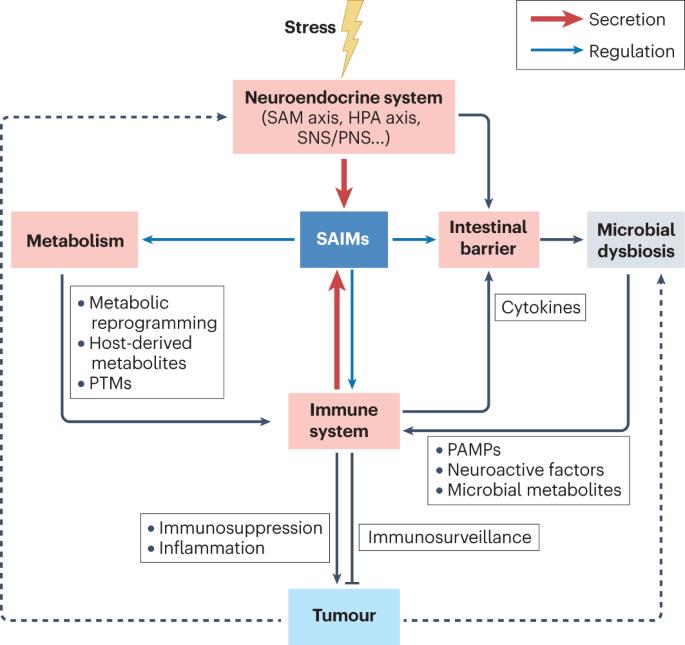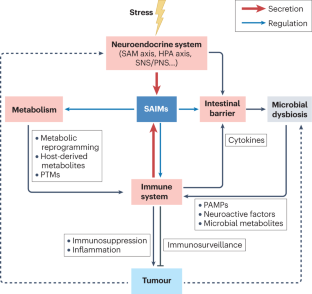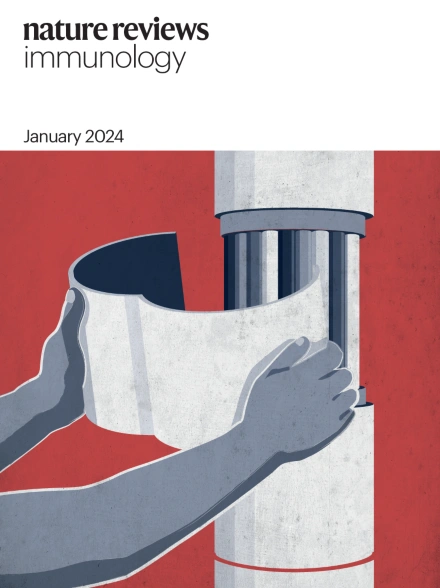The cancer-immune dialogue in the context of stress
IF 67.7
1区 医学
Q1 IMMUNOLOGY
引用次数: 0
Abstract
Although there is little direct evidence supporting that stress affects cancer incidence, it does influence the evolution, dissemination and therapeutic outcomes of neoplasia, as shown in human epidemiological analyses and mouse models. The experience of and response to physiological and psychological stressors can trigger neurological and endocrine alterations, which subsequently influence malignant (stem) cells, stromal cells and immune cells in the tumour microenvironment, as well as systemic factors in the tumour macroenvironment. Importantly, stress-induced neuroendocrine changes that can regulate immune responses have been gradually uncovered. Numerous stress-associated immunomodulatory molecules (SAIMs) can reshape natural or therapy-induced antitumour responses by engaging their corresponding receptors on immune cells. Moreover, stress can cause systemic or local metabolic reprogramming and change the composition of the gastrointestinal microbiota which can indirectly modulate antitumour immunity. Here, we explore the complex circuitries that link stress to perturbations in the cancer-immune dialogue and their implications for therapeutic approaches to cancer. Epidemiological studies and mouse models suggest that stress can affect the evolution, dissemination and outcome of malignancies. In this Review, Ma and Kroemer present insights into the complex neuro-immune interactions that link stress to cancer, with a focus on stress-associated immunomodulatory molecules, and discuss their implications for cancer therapy.


在压力的背景下进行的癌症-免疫对话。
尽管几乎没有直接证据支持压力会影响癌症的发病率,但正如人类流行病学分析和小鼠模型所示,压力确实会影响肿瘤的演变、传播和治疗结果。生理和心理压力源的经历和反应可以引发神经和内分泌改变,从而影响肿瘤微环境中的恶性(干)细胞、基质细胞和免疫细胞,以及肿瘤大环境中的系统性因素。重要的是,可以调节免疫反应的压力诱导的神经内分泌变化已经逐渐被发现。许多应激相关免疫调节分子(SAIMs)可以通过与免疫细胞上的相应受体结合来重塑自然或治疗诱导的抗肿瘤反应。此外,压力会导致全身或局部代谢重编程,并改变胃肠道微生物群的组成,从而间接调节抗肿瘤免疫。在这里,我们探讨了将压力与癌症-免疫对话中的干扰联系起来的复杂回路,以及它们对癌症治疗方法的影响。
本文章由计算机程序翻译,如有差异,请以英文原文为准。
求助全文
约1分钟内获得全文
求助全文
来源期刊

Nature Reviews Immunology
医学-免疫学
CiteScore
93.40
自引率
0.40%
发文量
131
审稿时长
6-12 weeks
期刊介绍:
Nature Reviews Immunology is a journal that provides comprehensive coverage of all areas of immunology, including fundamental mechanisms and applied aspects. It has two international standard serial numbers (ISSN): 1474-1733 for print and 1474-1741 for online. In addition to review articles, the journal also features recent developments and new primary papers in the field, as well as reflections on influential people, papers, and events in the development of immunology. The subjects covered by Nature Reviews Immunology include allergy and asthma, autoimmunity, antigen processing and presentation, apoptosis and cell death, chemokines and chemokine receptors, cytokines and cytokine receptors, development and function of cells of the immune system, haematopoiesis, infection and immunity, immunotherapy, innate immunity, mucosal immunology and the microbiota, regulation of the immune response, signalling in the immune system, transplantation, tumour immunology and immunotherapy, and vaccine development.
 求助内容:
求助内容: 应助结果提醒方式:
应助结果提醒方式:


